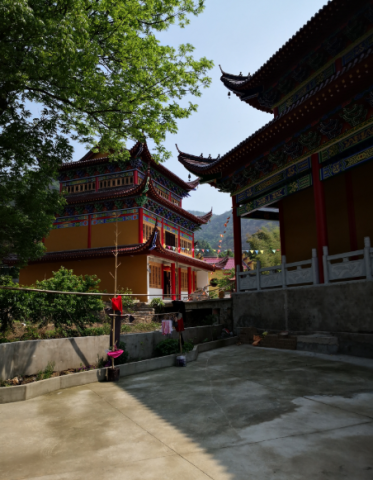
I went to Shiwan Yanshan to visit the Guroushan Plank Road. This mountain road paved with granite, which is seven miles up and eight miles down, is related to a fight hundreds of years ago.
I had contacted my relative Yanshan Farmer beforehand. Following the Yanshan farmer's car, we turned into an alley and soon arrived at Zhunti Temple. The ancient plank road starts from the side of Zhunti Temple and passes through Gulou Mountain to Wuwei Kunshan. Gulou Mountain belongs to the Yanshan Mountains. From a distance, the mountain is not high, and a gray-white winding mountain road is looming among the dense woods. The weather was fine, and the sky behind the mountain peaks was so blue that there was no trace of impurities. I made up a name for this blue: Qingshan Blue.
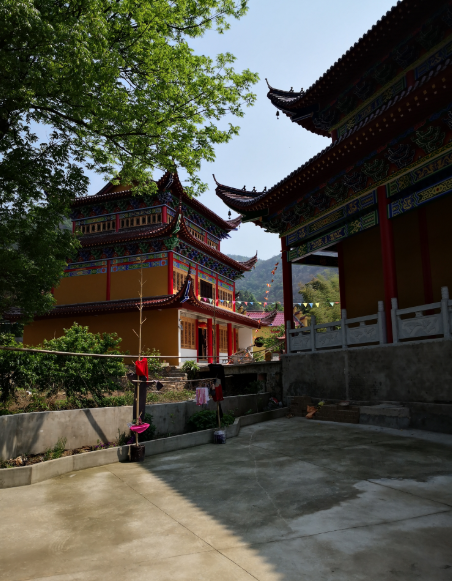
I plan to use my feet to measure the Gulou Mountain Plank Road in order to verify my judgment on the "Dongxiang Borrowed Road" incident. During the Taiping Heavenly Kingdom, the Taiping Army "borrowed" routes to Zhoutan, Zuogang, Wuqiao and other places in Tongcheng Dongxiang many times due to the need for military maneuvers. In the third year of Xianfeng (AD 1853), the Qing government ordered all prefectures and counties to form local militia groups in an attempt to contain the Taiping Army with civilian forces. Fierce military conflicts broke out repeatedly between the Dongxiang militia groups and the Taiping Army passing through the border. The Taiping Army lost troops and horses, and Dongxiang Lianyong suffered heavy casualties. "Dongxiang Borrowed Road" is not only seen in oral tradition among the people, but also in the genealogy of the Dongxiang surnames such as Yaoshi Zhou, Shanbian Zhang, Zuodangzuo, Yashan Wang and so on. Both "Yao Shi Zhou Family Genealogy" and "Zuodang Zuo Family Genealogy" have a "Biography of Volunteers and Braveness", and the excerpts are as follows:
"Dongxiang of Anhui Tong is good at martial arts and bravery. He can kick his feet and fly with his fists. If he uses eyebrow sticks, wolf-toothed swords, white striped knives, etc., he does not need to be taught by a teacher, but even the villagers can often do it. This is because of their customs. . When the world is peaceful, there may be a tendency to fight privately, and the elders of the clan will be restrained and maintained in a safe manner. When the situation is chaotic, they will use their strength to resist foreign aggression. Therefore, the Guangdong bandits have been trapped in Tong for several years, and they have been harmed by pigs and snakes. However, Yan Ran, who lives in this country, is not vicious at all.
"The Xianfeng period was over, and when the border was violated, Chen Yucheng, the leader of the thieves, became furious and sent his generals to unite tens of thousands of thieves, who were about to annihilate them. My third uncle summoned his brother Lin Tong to Nachuan, and led his clan neighbors dozens of miles away. We tried our best to block the defense and defended each pass to stop the front. When the thieves attacked with firearms, we were unable to support them and the pass was lost. The two armies fought hand-to-hand. The courage of our troops was one hundred, but it was a pity that we had no muskets and artillery to support them. , so it is inevitable to break the north ear.
"First, the thieves attacked by land and water. Thanks to Li Gong from the main town of Datong Town, named Delin, who quickly sent reinforcements, the water thieves were defeated and retreated. As a result, every household used boats to carry men and women. However, the brave ones only lurked in the mountains. The bandits occupied Zhoutan Town for several days, burning and plundering them in all directions. The brave men looked around and intercepted and annihilated them, while those who were trapped were able to escape. . In less than half a month, the remaining thieves were frightened and fled at night, returning to Wancheng..." ("Yao Shi Zhou Family Genealogy")
"In the ninth year of Xianfeng, when the bandits were at Huangbo Ridge, Zuo Maosheng, Zuo Zhengxiang, Zuo Shanglin, Zuo Futong, and Zuo Sengui were killed in battle at the same time. In the eleventh year, Zuo Zhengbai died in Luyi Fanshan, and Zuo Mei He was good at guarding against thieves in Qianchuan, and for three days, he was exhausted and vomited blood and died.
"When the bandits arrived at Huangbo Ridge, my brother Mao Sheng trained his troops to attack them. We used a long snake in the formation, struck the head and tail, struck the head and tail, struck the waist and the head and tail. At that time, the brother with the same fortune will be the tail, and the one with Mao Sheng will be the tail. When he was on the head, the thieves resisted and attacked him twice. After a few dozen attacks, the outcome was still unclear. The group of thieves struck deeply at his waist. Brother Zhengxiang and Shang Lin attacked him, but the head and tail could not match each other. Lin said to Zhengxiang: "If the two of us die today, my father's revenge will be avenged, and the thieves will be defeated. Brother, I will fight hard!" Then Mao Sheng and Fu Tong fought hard against the thieves. Those who knew they would die were sweating like rain. , those with dark faces and ocher all over, the Zhengxiang people were exhausted and shed white blood, killing countless thieves. As a result, my uncle Sengui also died..." ("Zuo Dan Zuo Clan." Spectrum")
These two genealogies both describe the "borrowing" incident in the ninth year of Xianfeng. The genealogy was not far away from the "borrowing" incident, and the content is credible. Based on the above text and relevant historical materials, the Taiping Army had lax discipline, burned, killed, and looted wherever they went, and committed many evil acts. The derogatory name "Long Mao" for them reflects the attitude and tendency of the people towards the Taiping Army. Declassified information on the Taiping Rebellion in recent years has also revealed that after the Taiping Army established its capital in Nanjing, its main leaders indulged in sensuality, lost the support of the people, and were in trouble both internally and externally. The reasons for the failure of the Dongxiang Militia were firstly due to their backward weapons. After all, war is a large-scale battle, not a solitary fight in the cold weapon era. Although "a hundred of our troops are as brave as a thousand" and Zhang Guanao, the leader of the thirty-six sects, "those arrows, stones and artillery are raining down, but they cannot hit, and they are like no one in and out of the siege." How can swords, guns, swords and halberds compete with guns and artillery? Second, the Dongxiang militia lacked unified command and coordination. Compared with the Taiping Army field troops who had experienced hundreds of battles and had rich experience in large-scale operations, they were obviously at a disadvantage. Failure was naturally inevitable.
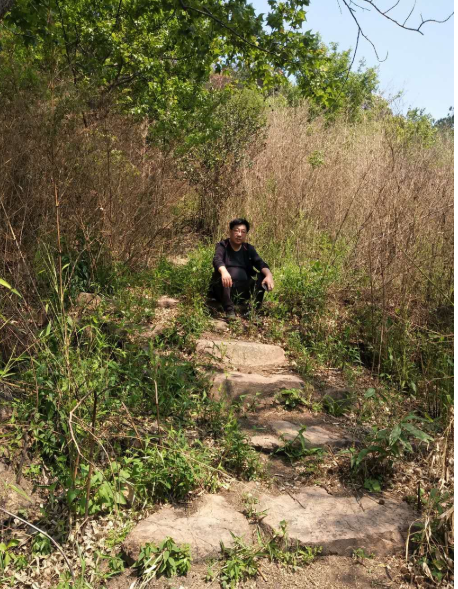
Not long ago, I published "Which road did "Dongxiang Borrow Road" borrow from on the Liuchixiang Cultural Public Account? Regarding the "Dongxiang Borrowed Road" incident, the difference between my views and those of many fellow villagers is:
1. The "Dongxiang Borrowing Road" was a normal military maneuver carried out by the Taiping Army between Tianjing and Tongcheng along the land route. It was not an isolated incident, and the borrowing of the road occurred more than once. This time in the ninth year of Xianfeng's reign should be the most intense and costly conflict between the Taiping Army and the Dongxiang Militia. In addition, there are two "borrowing" incidents recorded in historical materials. "Records of Fenghe": "In the sixth year of Xianfeng, the thieves came to Tong from Wuwei, using Zhoujiatan as a shortcut. On the first day of the new year, from noon to dusk, they came after the group and wanted to camp on the mountainside to divide the group. ... Burning the mountainside "Songyang County Annals": "In June of the 11th year of Xianfeng (1861), the Taiping Army and Dongxiang Lianyong fought fiercely in Ma'anshan, Wujiaqiao and other places in Dongxiang, and annihilated 177 Lianyong people."
2. The road used by the Taiping Army may not be a certain shortcut. Via Huangboling Mountain Road, one can reach Tongcheng County from Zhoutan via Lujiang River, and one can reach Zhoutan territory via Guloushan Plank Road from Wuwei. These are the roads used by the Taiping Army. Many villagers believe that the road used by the Taiping Army should refer to the Huangbo Ridge Mountain Road, which can be supported by the genealogical records of Dongxiang Lianyong who died in the battle. I do not deny this, but in terms of military necessity, importance and frequency of borrowing roads, the core of "Dongxiang Borrowing Roads" is undoubtedly the Guroushan Plank Road in Shiwan Village, Zhoutan Town.
This time, I came to Shiwan Village in Zhoutan to verify my judgment.
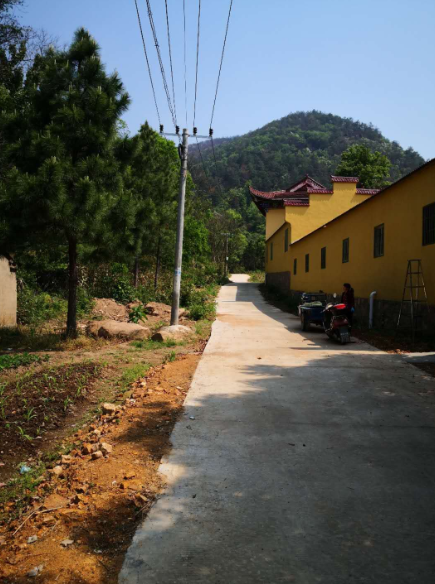
After parking the car, we stopped for a while at Zhunti Temple. Before the Yaoshi sage Zhou Dazhang, a Jinshi in the second year of Yongzheng's reign, was elected, he set up a hall to give lectures in Zhunti Temple. According to folklore, Zhou Dazhang was once the apprentice of the young prime minister Zhang Tingyu. Although there is no evidence to prove the legend, it made Shiwan Zhunti Nunnery famous far and wide. Anti-Japanese general Dai Anlan's grandmother lived in Shiwan. When his uncle saw that the young Anlan was a talented person, he gave him a tutor at Zhunti Temple. After the outbreak of the Anti-Japanese War, General Dai Anlan made illustrious military exploits that will shine through the annals of history. In 1942, General Dai Anlan led the 200th Division to participate in the war in Myanmar as the vanguard of the Chinese Expeditionary Force. He was seriously injured and died while commanding a breakout battle in the Langko area. Zhou Enlai wrote an elegy: "The hero of Huangpu is the hero of the nation."
Zhunti Nunnery was first built in the Chongzhen period of the late Ming Dynasty and has always been popular. After the war, the centuries-old nunnery turned into ruins. In 1995, local believers funded the reconstruction. The renovated nunnery has two main halls and houses more than ten Buddha statues. Master Shi Guoxing is the abbot of the nunnery, and the sound of the Buddha resonates far away. From the outside, the glazed golden roof of the Buddhist temple looks like it is piercing the sky. The door of the nunnery is open, but due to the epidemic, several Buddhist temples have been locked. Walked around the yard. I met an upright-looking mage hanging out clothes. I saluted and asked her about the location of the Gulou Mountain Plank Road. She politely replied: "There is a small stone road on the side of the Buddhist temple, leading to the mountain. Further up, the winding mountain road is covered. You go and have a look." She also followed me to the courtyard gate and gave me a I pointed in the direction. Monks are really compassionate.
The farmer from Yanshan said that there are only a few stone slabs along the road. We will look at it after we go down the mountain. We should go up the mountain first.
The Yanshan farmer's car drove ahead, and a few minutes later, the car got on the winding mountain road. The road condition of the winding mountain road is very good, with cement roads all the way to the top of the mountain. This road is very wide for farmers in Yanshan, but narrow for me who is used to driving on city roads. It feels like the wheels are rolling over the edge of the road. The terrible thing is that there are no guardrails on the outside of the road, it is smooth, and there is a deep ravine below that cannot be seen to the bottom. The road gets steeper as you go up. It was impossible not to look down, because the canyon stretched to the right and front. I had bouts of dizziness, sweating all over my body, and my feet were a bit unruly. My heart suddenly skipped a beat: This driving state was going to be bad. I calmed down and thought: I fell down today. I died while exploring the local culture. It was a well-deserved death.
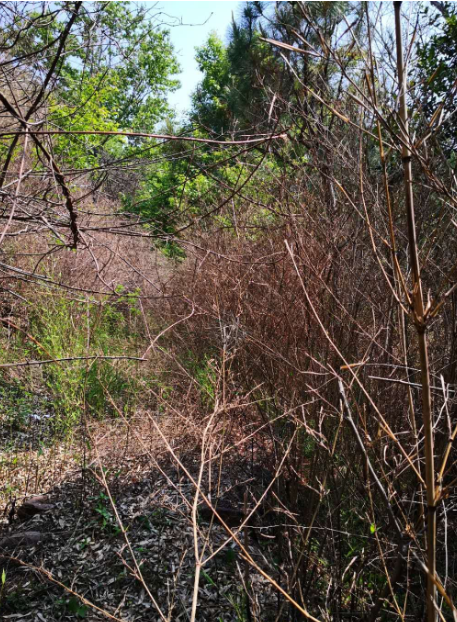
I don’t know whether it was self-suggestion that worked, or whether I got used to the winding mountain road, and the road ahead went smoothly. The whole journey is estimated to be about ten miles. Stopping several times along the way, the Yanshan farmer asked the old man who was planting trees on the mountainside for directions. There is a bungalow on the top of the mountain, which is used by people who look after the forestry. No one was in the house. Looking to the south is the inaction area. Houses look like buildings at the foot of the mountain, the white ribbon-shaped Yangtze River stretches across the earth, and a row of green hills in the south of the Yangtze River stick to the sky like paper cuts. I was highly focused along the way. I was still thinking about "Dongxiang Borrowing Road" on the top of the mountain, and I forgot one important thing: taking photos.
I lit a cigarette with the farmer from Yanshan and rested for a while on the top of the mountain. A farmer from Yanshan said: When I was a kid, I went up the mountain to cut firewood and walked this road countless times. I just asked the old man who planted the tree, and he also said that the cement road was built to cover the ancient plank road, and now there is still a small section at the bottom of the mountain. I said: The master of Zhunti Temple also said the same. Why build this cement road? The farmer from Yanshan answered: There have been several wildfires in the mountains in this area. A good road should be built to make it easier for fire-fighting equipment and firefighters to go up the mountain. I asked: Who built the ancient plank road? The farmer from Yanshan answered: This mountain road goes up seven miles and goes down eight miles. It starts at the edge of Zhunti Temple in Shiwan and ends at Wuwei Kunshan. It is said that Zhou Yuangen, a wealthy businessman from Wuwei, built it to facilitate his daughter's return to her parents' home.
Driving down the mountain, we still stopped at the wall of Zhunti Nunnery. After searching around, I found a section of stone steps paved with granite, extending up the mountain and submerged among airtight bamboos, weeds, and thorns. The farmer from Yanshan said that no one has walked on this road for many years. May is when the vegetation is lush. I tried to walk up step by step, but I couldn't get in any further. Still haven’t done enough homework: Wear camouflage clothing, hiking shoes, and bring a sharp machete. The Yanshan farmer said that if you walk about ten steps further, you will be blocked by a cement road. Although this visit to the Guroushan Plank Road left me with a little regret, I will not change my judgment on the "Dongxiang Borrowed Road" incident at the moment. I’ll take the opportunity to visit Huangbo Ridge Mountain Road again, and wait for the sequel to my ancient plank road.
